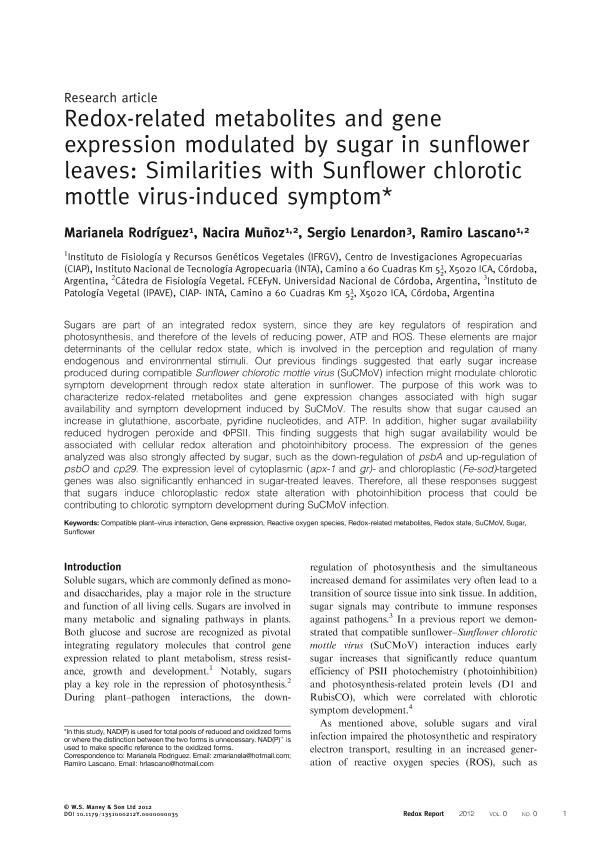Mostrar el registro sencillo del ítem
dc.contributor.author
Rodriguez, Marianela Soledad

dc.contributor.author
Muñoz, Nacira Belén

dc.contributor.author
Lenardon, Sergio Luis

dc.contributor.author
Lascano, Hernan Ramiro

dc.date.available
2017-08-18T19:34:04Z
dc.date.issued
2013-07
dc.identifier.citation
Rodriguez, Marianela Soledad; Muñoz, Nacira Belén; Lenardon, Sergio Luis; Lascano, Hernan Ramiro; Redox-related metabolites and gene expression modulated by sugar in sunflower leaves: Similarities with Sunflower chlorotic mottle virus-induced symptom; Taylor & Francis; Redox Report; 18; 1; 7-2013; 27-35
dc.identifier.issn
1351-0002
dc.identifier.uri
http://hdl.handle.net/11336/22692
dc.description.abstract
Sugars are part of an integrated redox system, since they are key regulators of respiration and photosynthesis, and therefore of the levels of reducing power, ATP and ROS. These elements are major determinants of the cellular redox state, which is involved in the perception and regulation of many endogenous and environmental stimuli. Our previous findings suggested that early sugar increase produced during compatible Sunflower chlorotic mottle virus (SuCMoV) infection might modulate chlorotic symptom development through redox state alteration in sunflower. The purpose of this work was to characterize redox-related metabolites and gene expression changes associated with high sugar availability and symptom development induced by SuCMoV. The results show that sugar caused an increase in glutathione, ascorbate, pyridine nucleotides, and ATP. In addition, higher sugar availability reduced hydrogen peroxide and ΦPSII. This finding suggests that high sugar availability would be associated with cellular redox alteration and photoinhibitory process. The expression of the genes analyzed was also strongly affected by sugar, such as the down-regulation of psbA and up-regulation of psbO and cp29. The expression level of cytoplasmic (apx-1 and gr)- and chloroplastic (Fe-sod)-targeted genes was also significantly enhanced in sugar-treated leaves. Therefore, all these responses suggest that sugars induce chloroplastic redox state alteration with photoinhibition process that could be contributing to chlorotic symptom development during SuCMoV infection.
dc.format
application/pdf
dc.language.iso
eng
dc.publisher
Taylor & Francis

dc.rights
info:eu-repo/semantics/openAccess
dc.rights.uri
https://creativecommons.org/licenses/by-nc/2.5/ar/
dc.subject
Redox-Related Metabolites
dc.subject
Sucmov
dc.subject
Gene Expression
dc.subject
Sugar
dc.subject.classification
Bioquímica y Biología Molecular

dc.subject.classification
Ciencias Biológicas

dc.subject.classification
CIENCIAS NATURALES Y EXACTAS

dc.title
Redox-related metabolites and gene expression modulated by sugar in sunflower leaves: Similarities with Sunflower chlorotic mottle virus-induced symptom
dc.type
info:eu-repo/semantics/article
dc.type
info:ar-repo/semantics/artículo
dc.type
info:eu-repo/semantics/publishedVersion
dc.date.updated
2017-08-18T14:59:18Z
dc.journal.volume
18
dc.journal.number
1
dc.journal.pagination
27-35
dc.journal.pais
Reino Unido

dc.journal.ciudad
Londres
dc.description.fil
Fil: Rodriguez, Marianela Soledad. Instituto Nacional de Tecnología Agropecuaria. Centro de Investigaciones Agropecuarias. Instituto de Fisiología y Recursos Geneticos Vegetales; Argentina. Consejo Nacional de Investigaciones Científicas y Técnicas; Argentina
dc.description.fil
Fil: Muñoz, Nacira Belén. Instituto Nacional de Tecnología Agropecuaria. Centro de Investigaciones Agropecuarias. Instituto de Fisiología y Recursos Geneticos Vegetales; Argentina. Consejo Nacional de Investigaciones Científicas y Técnicas; Argentina
dc.description.fil
Fil: Lenardon, Sergio Luis. Instituto Nacional de Tecnología Agropecuaria. Centro de Investigaciones Agropecuarias. Instituto de Patología Vegetal; Argentina
dc.description.fil
Fil: Lascano, Hernan Ramiro. Instituto Nacional de Tecnología Agropecuaria. Centro de Investigaciones Agropecuarias. Instituto de Fisiología y Recursos Geneticos Vegetales; Argentina. Consejo Nacional de Investigaciones Científicas y Técnicas; Argentina
dc.journal.title
Redox Report

dc.relation.alternativeid
info:eu-repo/semantics/altIdentifier/doi/http://dx.doi.org/10.1179/1351000212Y.0000000035
dc.relation.alternativeid
info:eu-repo/semantics/altIdentifier/url/http://www.tandfonline.com/doi/full/10.1179/1351000212Y.0000000035
Archivos asociados
